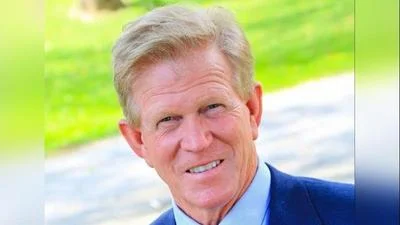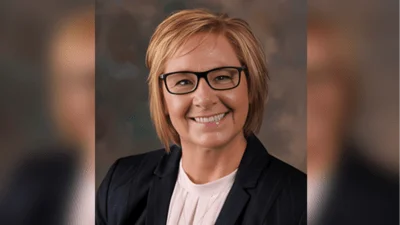State Representative Brad Halbrook | Illinois General Assembly
State Representative Brad Halbrook | Illinois General Assembly
According to the Illinois General Assembly site, the legislature summarized the bill's official text as follows: "Amends the Department of Revenue Law of the Civil Administrative Code of Illinois. Provides that the Department of Revenue shall establish and administer a property tax relief pilot program. Provides that eligible homeowners shall receive a one-time direct relief payment in an amount equal to a percentage, determined by the Department by rule, of the eligible homeowner's property tax liability for the 2025 tax year. Requires the Department of Revenue to submit a report in connection with the Program to the Governor and the General Assembly. Creates the Property Tax Relief Program Fund of 2026. Provides that moneys in the Fund shall be used by the Department for the purpose of making property tax relief payments. Amends the State Finance Act to make conforming changes."
The following is our breakdown, based on the actual bill text, and may include interpretation to clarify its provisions.
In essence, this bill establishes a property tax relief pilot program under the Department of Revenue in Illinois, providing eligible homeowners with a one-time direct relief payment. The payment is calculated as a percentage of their 2025 property tax liability, with the amount determined by departmental rules. To qualify, properties must be residential, and homeowners must apply by August 31, 2026. The department will report to the Governor and General Assembly by Sept. 1, 2027, detailing the distributed payments and offering future recommendations. A Property Tax Relief Program Fund of 2026, allocated with $6 billion from the General Revenue Fund, will finance the payments. The program will be repealed on Jan. 1, 2028.
Brad Halbrook has proposed another two bills since the beginning of the 104th session.
Brad Halbrook is currently serving in the Illinois State House, representing the state's 107th House District. He replaced previous state representative Blaine Wilhour in 2023.
Bills in Illinois follow a multi-step legislative process, beginning with introduction in either the House or Senate, followed by committee review, floor debates, and votes in both chambers before reaching the governor for approval or veto. The General Assembly operates on a biennial schedule, and while typically thousands of bills are introduced each session, only a fraction successfully pass through the process to become law.
You can read more about bills and other measures here.
| Bill Number | Date Introduced | Short Description |
|---|---|---|
| HB1495 | 01/21/2025 | Amends the Department of Revenue Law of the Civil Administrative Code of Illinois. Provides that the Department of Revenue shall establish and administer a property tax relief pilot program. Provides that eligible homeowners shall receive a one-time direct relief payment in an amount equal to a percentage, determined by the Department by rule, of the eligible homeowner's property tax liability for the 2025 tax year. Requires the Department of Revenue to submit a report in connection with the Program to the Governor and the General Assembly. Creates the Property Tax Relief Program Fund of 2026. Provides that moneys in the Fund shall be used by the Department for the purpose of making property tax relief payments. Amends the State Finance Act to make conforming changes. |
| HB1496 | 01/21/2025 | Amends the Property Tax Code. Provides that, beginning with the 2026 assessment year, the valuation of property in any general assessment year may not exceed (i) 101% of the value of the property in the previous tax year if the property is residential or (ii) 102% of the value of the property in the previous tax year if the property is not residential. Provides that the limitation does not apply if the increase in value is due to an addition, modification, or improvement to the property or if there has been a change in ownership of the property during the previous tax year. Preempts the power of home rule units to tax. |
| HB1497 | 01/21/2025 | Amends the Property Tax Extension Limitation Law in the Property Tax Code. Provides that, for levy years 2026 through 2030, the term "taxing district" includes each home rule taxing district. Provides that, for levy years 2026 through 2030, the extension limitation is 0% or the rate of increase approved by the voters. Contains provisions setting forth the aggregate extension for taxing districts that became subject to the Property Tax Extension Limitation Law as a result of the amendatory Act. Sets forth powers and duties of the Department of Revenue. Limits the power of home rule units to tax. Effective immediately. |
| HB1500 | 01/21/2025 | Creates the Illinois-Indiana Boundary Adjustment Commission Participation Act. Provides that, if and only if House Bill 1008 of the 124th Indiana General Assembly becomes law, then, no more than 60 days after receiving a specified notice from the Governor of Indiana, the Governor shall appoint 5 members to the Illinois-Indiana Boundary Adjustment Commission. Set forth provisions concerning terms, vacancies, and reimbursement. Provide that, no later than 60 days after the completion of the Illinois-Indiana Boundary Adjustment Commission's duties, the members appointed under the Act shall submit a report to the General Assembly. Effective immediately. |
| HB1400 | 01/16/2025 | Amends the Time Standardization Act. Provides that daylight saving time shall be the year-round standard time of the entire State. Makes other changes. |
| HB1347 | 01/14/2025 | Amends the Environmental Protection Act. In a provision regarding prohibited acts, provides that no person shall operate a commercial energy conversion facility in a manner that causes, threatens, or allows the release of oil, lubricant, hydraulic fluid, transformer solvent, insulation fluid, cleaning fluid, or any other similar fluid from the facility. Provides that any person who violates this prohibition shall, for each day of violation, be liable for a civil penalty of $1,000. Provides for a 100% reduction in penalty for a person who promptly self-discloses noncompliance with this provision and promptly begins repairs. |





 Alerts Sign-up
Alerts Sign-up